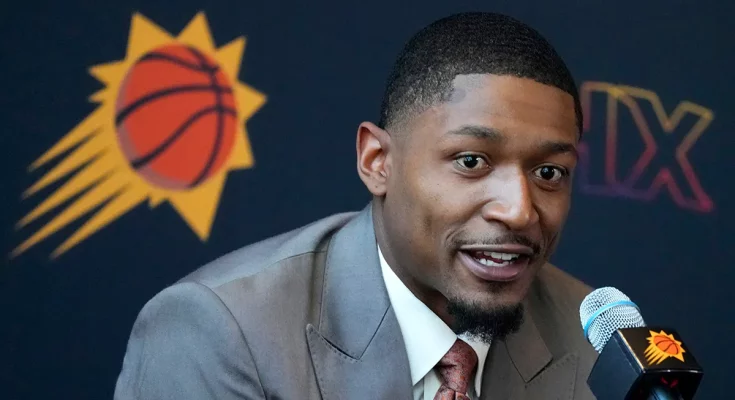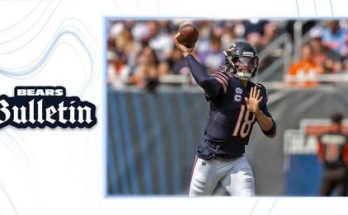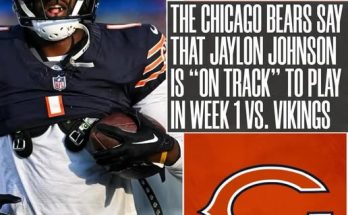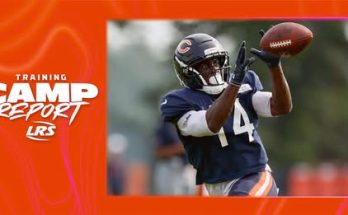Bradley Beal’s decision to leave the Phoenix Suns after a short-lived stint and join the Los Angeles Clippers has instantly become one of the most discussed moves of the offseason, not just because of the names and cities involved, but because of the timing, the circumstances, and the clarity with which Beal himself addressed his choice. In a league where players often speak in vague generalities about “fit” and “opportunity,” Beal was refreshingly direct in explaining what motivated him to swap the desert for the glitz and pressure of Los Angeles. His words painted a picture of a player who has grown both in self-awareness and competitive urgency, and who has reached a point in his career where every decision is filtered through the lens of chasing a championship.
Beal’s arrival in Phoenix last season was hailed as the missing piece for a Suns team that already boasted Kevin Durant and Devin Booker. On paper, that trio was supposed to be a nightmare for opposing defenses, combining Durant’s all-time scoring brilliance, Booker’s smooth versatility, and Beal’s ability to get buckets at all three levels. But what the basketball world quickly learned is that star power alone isn’t always enough to translate to cohesion, especially when availability, roster depth, and system fit come into play. Beal’s time in Phoenix was marred by nagging injuries that kept him from establishing a consistent rhythm alongside Durant and Booker, and even when the three did share the floor, the Suns often looked like a team still trying to figure out who would lead and who would follow in key moments.
For Beal, the frustration was compounded by the feeling that he wasn’t being used in ways that fully maximized his game. While he understood the necessity of making sacrifices in a star-laden lineup, he also felt the Suns’ offensive structure often left him as a secondary or even tertiary option, waiting in the corners or coming off pin-downs rather than initiating the offense or getting touches in his preferred spots. He spoke openly about how that adjustment was more challenging than anticipated. As someone who spent the bulk of his Washington Wizards tenure as the unquestioned focal point, being relegated to stretches where he barely touched the ball was a mental hurdle as much as a basketball one.
But it wasn’t just about touches. Beal acknowledged that Phoenix’s championship window, while real, was also incredibly narrow. The Suns had invested heavily in their top-end talent, leaving little flexibility to build out depth or pivot if the chemistry issues persisted. The team’s playoff run was cut short, and Beal was left wondering whether running it back would lead to a different outcome or simply more of the same. That internal questioning led him to take a harder look at his own career arc. At 31 years old, with multiple All-Star nods and over a decade in the league, he realized he couldn’t afford to gamble on “maybe” situations anymore. The next stop had to be one where the system fit him, the roster could adapt, and the championship ambitions were grounded in more than just hype.
That’s where the Clippers came into the picture. Los Angeles had been quietly monitoring Beal’s situation for months, knowing that Phoenix’s roster limitations could create an opening. While the Clippers have had their own frustrations—largely tied to the health of Kawhi Leonard and Paul George—the organization has remained aggressive in pursuing talent and adapting its roster to contend. Beal described his first conversation with Clippers management as “energizing,” noting that they laid out a plan for how he would be integrated into the offense that made him feel both valued and challenged. The vision wasn’t just about adding another scorer—it was about giving Beal a role where his playmaking, leadership, and experience could influence every possession.
What really caught Beal’s attention was the Clippers’ willingness to place him in a hybrid role. Rather than pigeonholing him as a spot-up shooter or a primary ball handler, the team planned to use him in multiple ways—sometimes leading the offense when Leonard or George rested, sometimes attacking off the catch, and often being the focal point of smaller, high-paced lineups designed to overwhelm defenses with spacing and skill. That level of flexibility, he said, reminded him of his best years in Washington, when he was given the freedom to read the game and dictate tempo. It also offered something Phoenix couldn’t: a chance to be a central part of a championship push without having to navigate the crowded pecking order he experienced alongside Durant and Booker.
The competitive landscape also played a role in his decision. Beal admitted that the Western Conference is brutal regardless of where you play, but he believed the Clippers’ mix of talent, coaching stability under Tyronn Lue, and depth across the roster gave them a more sustainable chance to make deep postseason runs. He highlighted the team’s defensive versatility, especially with Leonard, George, and role players like Terance Mann, as a factor that could take pressure off him to score 30 every night. In his view, that balance between offensive firepower and defensive toughness is what often separates good teams from true contenders in the playoffs.
Beyond basketball, there were personal considerations as well. Beal spoke about the appeal of Los Angeles as a place where his family could thrive and where he could expand his influence off the court. From business opportunities to philanthropic work, he felt the city offered avenues to grow his profile and set himself up for life after basketball. While winning remains his top priority, Beal admitted that being in a market with global reach was something he couldn’t ignore at this stage of his career.
Leaving Phoenix wasn’t easy, especially given the relationships he built with his teammates and the fans. Beal made it clear he had no bitterness toward the Suns and that he respected the organization for taking a chance on him. In fact, he said one of the hardest parts of the decision was calling Durant and Booker to tell them personally. Those conversations, he said, were emotional but supportive—both stars understood his reasoning and wished him well. Beal also credited Suns coach Mike Budenholzer, who had just been hired, for encouraging him to do what was best for his career even if it meant leaving.
As Beal looks ahead to his debut in Clippers colors, he’s under no illusions about the pressure that comes with the move. Los Angeles is not a patient market, and the franchise’s championship aspirations have been hanging over them since the Leonard-George era began. But Beal seems invigorated by that urgency. He talked about how, in Phoenix, the first year felt like a learning process with the hope that things would gel over time. With the Clippers, there’s no such grace period—he knows the expectation is to win immediately, and that’s exactly the kind of environment he wanted.
The way Beal framed it, this decision was about removing excuses. If the Clippers stay healthy and he performs at his best, they should be in the mix for a title. If they fall short, it won’t be because they lacked talent or resources. That clarity—knowing exactly what’s at stake—was the final push he needed to commit to the move. In his mind, the days of “seeing how it plays out” are over. Every season from here on out is about maximizing his prime and chasing the ultimate goal.
When asked if he worried about the perception that he’s chasing a ring, Beal didn’t hesitate. “Of course I’m chasing a ring,” he said. “If you’re not in this league to win a championship, then what are you doing? I’ve put in the years, I’ve put in the work, I’ve been loyal, and now it’s about finishing the story the right way.” That sentiment sums up his mindset perfectly. For Beal, the move to the Clippers isn’t just a change of jersey—it’s a declaration of intent. He’s ready to embrace the spotlight, the scrutiny, and the pressure because he believes that’s where the best version of himself emerges.
The Clippers now have another proven star who can swing a playoff series, and Beal has a fresh start with a franchise that’s betting heavily on this core to finally deliver. Whether or not the gamble pays off remains to be seen, but one thing is clear: Bradley Beal didn’t make this move lightly. Every factor, from on-court fit to off-court life, was weighed and measured. And in the end, the decision came down to a simple truth—he believes the Clippers give him the best chance to win it all before his window closes. For a player of his caliber and competitive fire, that was motivation enough to walk away from a promising but uncertain situation in Phoenix and step into the high-stakes world of championship-or-bust basketball in Los Angeles.



